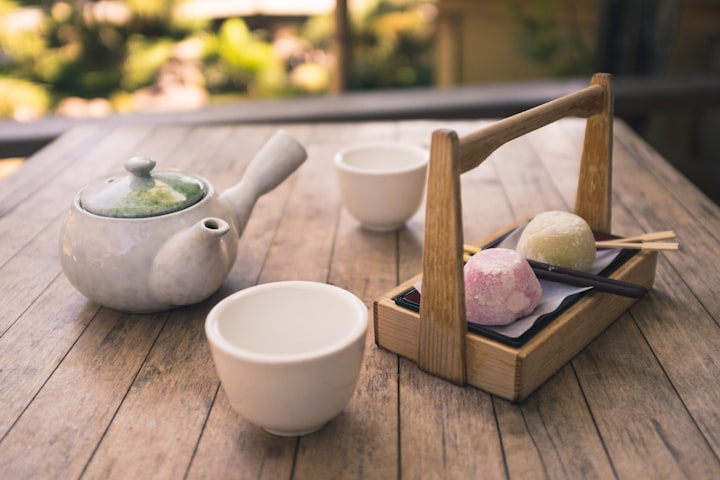
Japanese tea practice is an art form. It is not limited to the mere pouring of the tea into the teacups but instead is a 4-hour long process where every stage is treated delicately with a distinctive technique. From the preparation to the drinking of matcha, it incorporates precise and beautiful steps. This art is known as (o)temae.
According to the culture trip, the tea ceremony or the chadō (The way of tea) is seen as one of the cornerstones of Japanese culture. It is a wonderful expression of aestheticism and philosophy in perfect harmony. There is a long history of how the act of tea drinking came to take the form of this ceremony.
It is believed that tea was brought from China to Japan by Buddhist monks in the 9th century. Soon, it turned into a status symbol by the samurai and took the form of the eloquent ceremony it is known as today.
Chadō rests on 4 principles, namely harmony, respect, purity, and tranquility as given by tea master Sen Rikyu (1522–1591). The aim is to awaken the senses as well as unite the body and the mind of the participants. You can incorporate these virtues in your writing career in order to ensure that your work shines brightly.
1. Harmony

Harmony or Wa focuses on the meeting of the guests and the host, with each other as well as the tea, utensils, and life. Here, the focus is to create peace by bringing together everything. All the utensils and the individuals involve in the process come together to form this beautiful art. In writing, bringing together yourself with nature can help you hone into your inner voice.
When you are mindful and aware of your own self and the surroundings, you can allow beautiful words to flow out of your consciousness into your writing. Therefore, when you write, become one with your writing tool. Do not allow any divide between yourself and your medium. Pour everything through the tip of your pen. Incorporate your inner voice with your writer’s voice and develop harmony between the two.
2. Respect

Respect or Kei is the ability to accept. In the tea ceremony, the host and the guests have deep respect and acceptance for each other. Any hierarchy between the two is dismantled when they are engaging in Chadō. In such ceremonies, even the shogun (emperor) is equal to the host.
As writers, you need to respect your readers. Just because you are creating content and they are consuming it, does not mean that you have power over them. Rather you both need each other to exist. You can respect your readers by creating good content. Write because you want your readers to read and take something from that, not for the sake of posting on a regular basis. When they are reading your article, they should not feel that they wasted their time.
3. Purity

Sei or purity is keeping your heart open and naive towards others. Here, it is believed that keeping yourself pure would allow you to achieve harmony and respect. In the tea ceremony, it is ensured that the clothes and the surrounding are kept pure. You, as a writer, need to keep your heart as well as mind pure. When you write, do not let negative thoughts and self-doubt creep in and contaminate your thoughts. Keep it clean as a white piece of paper. Do not allow any distraction to come onto your ‘white paper’.
One of the methods that work for keeping your mind clutter-free is mind dump. Here, before you actually start working on your piece, take a paper and write down all the worries and distractions. Let it all out. You can freely associate by allowing the first line to lead to the second line and so on. This will allow you to be free of such distractions while writing. With your mind, keep your surroundings pure as well. Make sure that your desk has only the essential items that you are going to use.
4. Tranquility

Jaku or tranquility is to remain calm even amid chaos. The entire process of the Japanese tea ceremony is based upon the concept of Jaku. No one rushes through the steps. Both the host and the guests sip their teas and enjoy every fiber of its taste. As a writer, you should incorporate tranquility in your writing routine. If you get stressed and anxious before you have even started writing, the true essence of it would be lost amongst your worry.
- Practice mindfulness where you allow yourself to become aware of your thoughts. Be there without judging them.
- Personalize a morning routine where you are not hurrying up, but soaking in the morning as you go about it.
- Organizing your schedule would make sure that you do things that are at important, first.
- Declutter your workspace.
Final thoughts

To develop your brand as a writer, you need to make your writing stand apart. In order to achieve this, follow the four wonderful concepts given in the Japanese tea ceremony. The moment I came across this concept, my mind went to the possibility of using these virtues to polish myself as a writer.
These are not only limited to your life but can also be applied to your writing pieces. Bringing these into your life would help you succeed as a writer and as a person.
About the Creator
Jjyoti
24. Full-time post-grad student. Part-time writer.
Support me: https://ko-fi.com/jjyoti






Comments
There are no comments for this story
Be the first to respond and start the conversation.